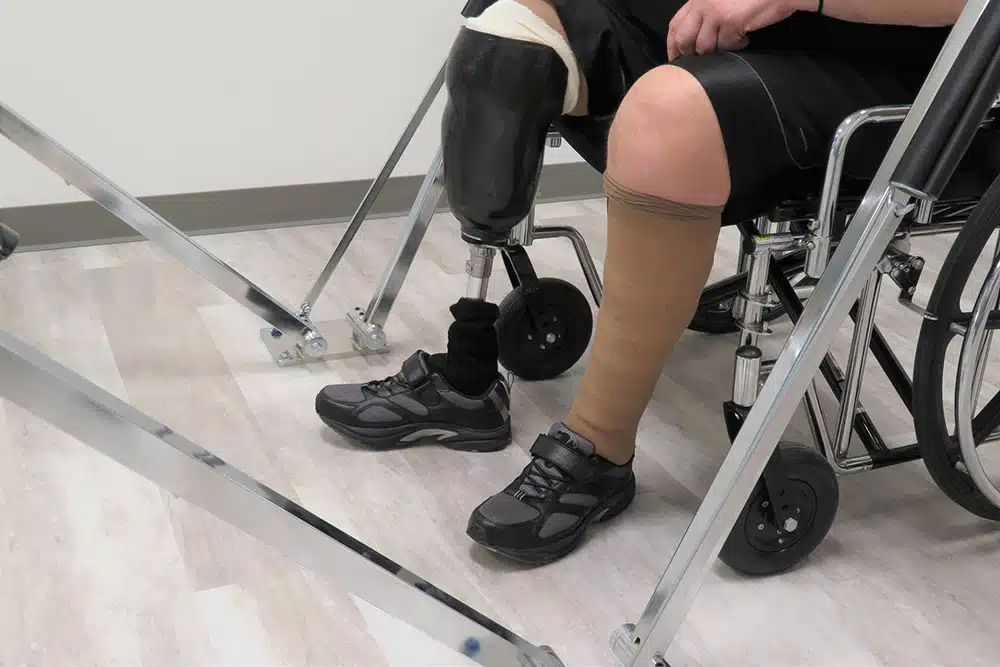The loss of a limb under any circumstances is a life-changing event that is accompanied by physical and emotional pain as well as financial hardship. When amputation occurs because of a medical error on the part of a healthcare professional, the suffering a victim endures can be even greater. The mental anguish and confusion over what led to the amputation can be devastating.
If you or a loved one experienced an amputation that you believe was due to medical malpractice, you may be feeling overwhelmed by a deep sense of loss and want help but don’t know whom to ask. No one can change the fact of the amputation, but compassionate aid from experienced Florida medical malpractice attorneys can help you cope with this loss, secure the financial compensation you need and obtain the justice you deserve.
In this blog post, we will try to provide enough information about medical malpractice amputation cases in Florida to help you understand why you should consider pursuing a medical malpractice claim for damages. Every case is unique and getting advice from an experienced Florida medical malpractice attorney is recommended; however, there are some key points that relate to most cases of amputation caused by medical negligence. This blog post will present those points and explain your right to hold negligent health care professionals accountable for the life-altering emotional, financial and physical damages their negligence caused.
How Prevalent Are Amputations?
Amputation is the loss or removal of a body part such as a finger, toe, hand, foot, arm, or leg, which may be traumatic or surgical. According to Johns Hopkins Medicine, about 45 percent of amputations are traumatic, caused by things such as motor vehicle accidents, combat injuries, and industrial accidents. Surgical amputation may be necessary because of trauma to the limb that cannot be repaired (a crushed leg, for example) or because of infection/necrosis that cannot be reversed.
Figures published by the Amputee Coalition also tell us that:
- There are 2.1 million people living with limb loss in the USA, and that number is expected to double by 2050.
- 185,000 people experience an amputation each year, meaning just over 500 amputations are performed, on average, every day.
- The average lifetime healthcare costs for people with limb loss are $509,275 compared to $361,200 for people without limb loss. (Note: In our experience the life care and medical needs of an amputee are a large multiple of this figure but, unfortunately, in the absence of a personal injury or medical malpractice lawsuit award most people do not obtain all the support that they need).
- Around 30% of people with limb loss experience depression and/or anxiety.
Losing a body part for whatever reason is life-altering. However, when the loss is due to a doctor or other health care professional’s mistake or negligence, it can be life-shattering. Understanding and proving that the amputation was caused by medical malpractice can also be difficult, but experienced Florida medical malpractice attorneys have the knowledge, skill and resources to amass the evidence needed to prove medical malpractice and obtain substantial compensation for their injured clients.
What Is Considered Medical Malpractice in Florida?
In the United States, we are accustomed to relying on doctors, hospitals, and other health care professionals to help us recover when we are injured or sick. Sadly, instead of healing us, negligent medical care providers can cause their patients to suffer catastrophic injury.
Not all errors or mistakes made by a health care professional can be considered medical malpractice; however, because they have specialized training and experience, Florida law does hold doctors, nurses and other healthcare professionals to a high standard of care when evaluating mistakes and errors. If a healthcare professional violates the duty of care owed to a patient, the law may allow the injured patient to pursue compensation for damages resulting from medical malpractice.
State law defines the “standard of care” that is applicable in a medical malpractice lawsuit. In Florida, the standard of care a healthcare provider is expected to provide is defined in Florida Statute 766.102(1) as “that level of care, skill, and treatment which, in light of all relevant surrounding circumstances, is recognized as acceptable and appropriate by reasonably prudent similar healthcare providers.” Put another way, the question to consider is whether another doctor/nurse/healthcare provider with the same level of experience and education would have done the same thing under the same circumstances. If the answer is “no,” then the healthcare provider may well have committed medical malpractice.
How Can an Amputation Be Due to Medical Malpractice?
When some people consider the possibility of amputation due to medical malpractice, they may envision a surgeon performing an amputation on the wrong person. While that does happen, there are a myriad of other types of medical malpractice that can also lead to amputation that includes, among many others, the following examples::
- Surgery that was performed on the right patient, but on the wrong limb
- Failing to diagnose or misdiagnosing a medical condition, such as diabetes or vascular disease, that leads to amputation
- Infection caused by a foreign object left inside a patient during surgery that leads to the need for amputation
- Failing to diagnose and treat blood clots that cut off circulation to a limb that necessitates amputation
- Prescribing the wrong medication or failing to catch dangerous drug interactions that affect a limb and leads to amputation
- Using unsterile medical devices, such as IVs and catheters, that causes serious infection and leads to the need for amputation
- Delayed diagnosis of an infection that leads to a gangrenous condition that requires amputation
- Delayed diagnosis of a compartment syndrome where excessive swelling and increased pressure in the muscle compartments of an extremity leads to impaired circulation and the need for amputation
- Mismanagement of peripheral vascular disease leading to amputation
If any of these or other types of medical negligence led to your need for amputation, you have the right under Florida law to pursue a medical malpractice claim for damages. Bringing a claim against negligent doctors or other health care providers can not only help you obtain the financial compensation you need, it can also give you the justice you want while holding the negligent party accountable and hopefully preventing them from harming other patients.
When Can I Sue for Amputation Caused by Miami Medical Malpractice?
In the immediate aftermath of an amputation, it is not always clear why the amputation was necessary. It can be even less clear that the negligence of a surgeon, hospital, or another health care professional caused or contributed to the need for amputation. Unfortunately, however, the law imposes a time frame within which you must initiate a medical malpractice lawsuit or lose your right to pursue compensation.
The applicable statute of limitations is found in Florida Statute Section 95.11, which says that a medical malpractice lawsuit must be filed within two years from “the time the incident giving rise to the action occurred or within two years from the time the incident was discovered or should have been discovered with the exercise of due diligence.” Florida’s “statute of repose” also imposes an upper limit of four years from the date of the incident or occurrence out of which the cause of action accrued. However, an action brought on behalf of a minor may be pursued on or before the child’s eighth birthday. Also, if a healthcare provider commits fraud or misrepresentation that prevents the patient from timely discovering the medical negligence, this extends the statute of repose form 4 years to 7 years.
These relatively short timeframes make it very important to consult with a Miami medical malpractice lawyer immediately if you suspect that an amputation was due to medical malpractice. A qualified medical malpractice attorney will help you understand how the law applies to your particular case and make sure you file a claim within the permissible timeframe.
What Kind of Compensation Can I Receive in a Miami Amputation Medical Malpractice Lawsuit?
Once an amputation has occurred, the amputee must live with the physical and emotional pain caused by the loss for the remainder of his or her life. In addition, an amputation often leads to increased medical bills, the need for specialized equipment and loss of income.
As an injured person pursuing a medical malpractice lawsuit, you may be entitled to compensation for these damages from the negligent party (or parties), including:
- Pain and suffering. Physical pain, emotional trauma, mental anguish and other non-economic damages that people commonly think of as “pain and suffering.”
- Medical expenses. Past, current and even future medical expenses for things such as doctors, nurses, therapists, aides, medications, surgery, artificial limbs and prosthetic devices as well as other types of specialized equipment.
- Lost income. Lost income to date as well as anticipated future lost income due to not being able to work or not being able to work in the same capacity.
- Rehabilitation and therapy. As an amputee, you may require rehabilitative, physical and/or occupational therapy as well as psychological counseling.
- Your family’s losses. Your family may suffer due to the loss of your companionship, guidance, assistance and support.
- Other damages recoverable under Florida law.
In the event that a medical error leading to amputation resulted in the death of a family member, you may also be entitled to compensation for your loss in a Florida wrongful death lawsuit. Talking with an experienced Florida wrongful death attorney will help you understand your rights under the law.
Contact an Experienced Miami Amputation Medical Malpractice Lawyer
Amputation is not something that can be reversed. Instead, an amputee must live with the loss for his/her lifetime. If an amputation was caused by medical malpractice, the party (or parties) responsible should be held accountable, and the victim should receive substantial compensation for the many damages the amputation medical malpractice caused.
Medical malpractice is a highly complex area of the law that requires an experienced medical malpractice lawyer to navigate successfully. The medical malpractice attorneys at Boyers Law Group have the dedication, resources, and expertise necessary to prevail in a complex medical malpractice lawsuit and are committed to advocating on your behalf to secure you the maximum compensation possible.
Please call us at 305-512-7600 or submit the “Tell Us What Happened” form on our website to get expert advice from an experienced Florida medical malpractice attorney. You deserve answers to your questions as well as the maximum compensation allowable under the law.

